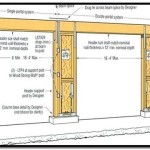How Much Does It Cost To Build a Block Garage?
Building a garage can be a significant investment, with costs varying widely depending on factors such as size, location, materials, and the complexity of the project. Concrete block garages, known for their durability and affordability, are a popular choice for homeowners. This article offers a comprehensive overview of the cost factors associated with constructing a block garage.
Factors Influencing the Cost
Several factors influence the cost of building a block garage. Understanding these variables will enable you to better estimate the expense and make informed decisions regarding your project.
Size: The size of the garage is a primary determinant of cost. A single-car garage typically ranges from 12x20 feet to 16x24 feet, while a two-car garage may measure 20x24 feet or larger. Naturally, larger garages require more building materials, labor, and permitting, leading to higher costs.
Location: The geographic location of the construction project significantly impacts expenses. Labor costs, material prices, and local building codes can differ considerably from region to region. Urban areas tend to have higher labor and material costs compared to rural areas.
Materials: The choice of materials for the garage's construction can influence cost. Concrete blocks, the primary building material, come in various sizes and types, each with its price point. Other materials, such as the roof, windows, doors, and flooring, will also impact the overall cost.
Complexity: The complexity of the garage design can significantly affect the cost. Features like a second story, multiple doors, or intricate architectural details can increase labor and materials expenses. Simpler designs generally lead to lower construction costs.
Permits and Inspections: Obtaining necessary permits and inspections from local authorities is essential for legal construction. Permit costs vary depending on location and the scope of the project. Inspection fees may also add to the overall expense.
Breakdown of Construction Costs
The cost of building a block garage can be broken down into the following key categories:
Materials
Materials represent a significant portion of the overall construction cost. Concrete blocks, the primary building material, typically account for a considerable amount of the expense. Other materials include:
Concrete blocks: The cost of blocks varies depending on size, type, and location. Consider factors like insulation and aesthetics when selecting blocks.
Mortar and grout: These materials are crucial for bonding blocks and creating a solid structure.
Foundation: The foundation, typically made of poured concrete, supports the garage and must be designed to withstand local soil conditions.
Roofing: The roof type and material will influence cost. Options include asphalt shingles, metal roofing, or tile.
Doors: Garage doors come in various styles, materials, and sizes, impacting the overall cost.
Windows: The number and size of windows will influence the cost. Consider energy-efficient options for reduced heating and cooling costs.
Flooring: Flooring options for garages range from concrete to epoxy coatings, each with a different price point.
Labor
Labor costs are another significant expense associated with garage construction. Factors determining labor costs include:
Construction crew size: The number of workers required for the project will influence labor costs. Larger crews generally lead to higher costs.
Labor rates: Labor rates vary depending on the skill level of the workers and the local labor market. Experienced workers may have higher hourly rates than less experienced workers.
Project duration: The length of time required to complete the project impacts labor costs. Longer projects require more labor hours, leading to higher expenses.
Permits and Inspections
Permits and inspections are necessary for legal construction and ensure compliance with local building codes. Costs associated with these services may include:
Permit fees: These fees vary depending on the location and scope of the project.
Inspection fees: Separate fees are typically charged for each inspection required during construction.
Additional Costs
Beyond the core construction costs, several other expenses may be incurred during the project, such as:
Site preparation: Clearing the site, excavating, and leveling the ground are necessary steps before construction can begin.
Utilities: Connecting utilities like electricity, water, and gas to the garage may be required.
Landscaping: Landscaping around the garage, including grading, seeding, and planting, adds to the overall expense.
Contingency: It's essential to include a contingency budget to cover unforeseen costs or changes to the project.
Conclusion
The cost of building a block garage is influenced by several factors, including size, location, materials, complexity, and permits. By understanding these factors and obtaining accurate estimates from qualified contractors, homeowners can make informed decisions regarding their garage construction project.

How Much Does It Cost To Build A Garage In 2024 Checkatrade

How Much Does It Cost To Build A Garage 2024 Data Angi

How Much Does It Cost To Build A Garage In 2024 Checkatrade

How Much Does A Cinder Block Garage Cost Guides Influencing Factors

Average Cost To Build A Garage Forbes Home

How Much Does It Cost To Build A Garage In 2024 Checkatrade

Fixr Com Cost To Build A Detached Garage 2 Car

Fixr Com Cost To Build A Detached Garage 2 Car

2024 Cost To Build A Garage 1 2 And 3 Car S Per Square Foot

How Much Does It Cost To Build A Garage In 2024 Checkatrade
Related Posts








